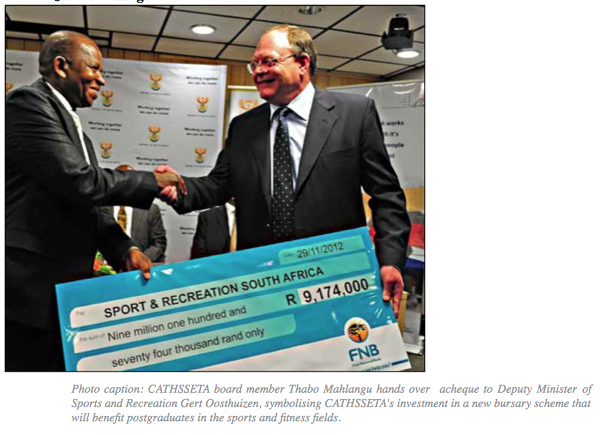A bursary scheme worth R9.74 million has been launched to assist postgraduate students in the sport, recreation and fitness field study towards their PhD or Master’s degrees.
 The scheme - an initiative by Sport and Recreation South Africa (SRSA) and the Culture, Arts, Tourism, Hospitality and Sport Sector Education and Training Authority (CATHSSETA) - will be offered to 30 post- graduate students per year over a period of three years.
The scheme - an initiative by Sport and Recreation South Africa (SRSA) and the Culture, Arts, Tourism, Hospitality and Sport Sector Education and Training Authority (CATHSSETA) - will be offered to 30 post- graduate students per year over a period of three years.
Deputy Minister of Sport and Recreation Gert Oosthuizen said the offer to potential students would include bursaries for 10 PhD and 20 Master’s studies per year over the three-year period.
He explained that the high levels of study were chosen following findings of a research analysis done by the department into the number of registered Master’s and Doctoral students at universities, which offer sport as a learning area.
“The findings are that there are only 267 postgraduate students in sports related studies at these 12 universities,” said the Deputy Minister.
The programme is aimed at addressing the shortage of skills, inadequately qualified individuals, and unemployed graduates in the will assist our sport system to close existing gaps in information and research which can in turn empower our system to address skills development and contribute towards employment creation,” he said.
The department will rely on higher education institutions in South Africa that offer sport, recreation and fitness as a field of study, to identify prospective students to receive the bursary.
Examples of topics that will be considered by the steering committee include:
- The impact of sport on social cohesion.
- The impact of sport on the improvement of the overall academic performance of learners.
- The correlation between winning athletes and a sustainable school sport programme and the position and role of women in sport and recreation.
“This programme will assist SRSA and government … in confronting the challenges of education, skills shortages, research and development as well as the triple challenges of poverty, unemployment and inequality,” said Oosthuizen.
The programme has three key pillars, namely the applied research programme, the action research programme and the postgraduate development programme.



 Facebook
Facebook Twitter
Twitter WhatsApp
WhatsApp